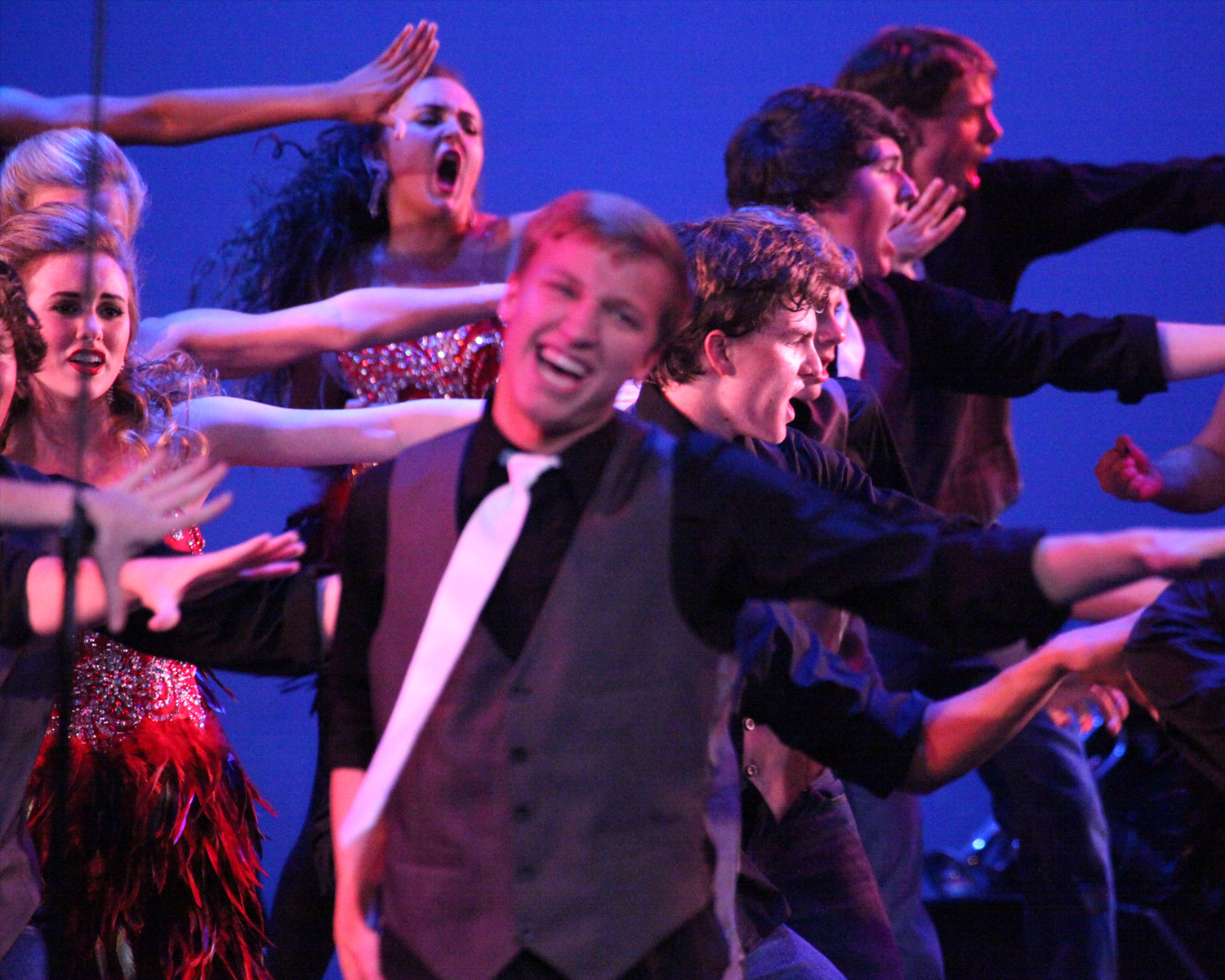
The Shift That Changed the Focus
When he decided to focus on counseling in his education, as opposed to a more general advanced degree in some field of education or musical theory, he knew he wanted to find a way to blend his two passions. He asked himself, “Are we just singing and dancing and having fun, or am I doing something that has an impact?”
At that point, he knew he wanted to do something special with his shows. He decided he would make it a mission to give his students something with long-lasting impact, something they could draw on in moments of adversity they were facing then or would someday face. He made a conscious choice to focus on ways to deliver a positive message.
He doesn’t announce his goals to the group, however. He prefers they have a more organic realization-a “lightbulb moment” so to speak. In fact, he says sometimes they “get” the show (the steps, the music, the harmonies), but at some later point they “really get” it-in that they absorb and internalize the message. He also prefers that the students draw their own conclusions, because that message can mean “something different to every kid.”
On that same note, he recognized that many show choirs have been working for years to promote a positive message, but he knew an effective message must be tailored to his specific group and his group’s community. For a message to be successfully delivered, he recognized that he would need to step outside of his comfort zone. Most importantly, he believed that a message only works if the director is “cognizant of the kids and what they’re dealing with.”
Thorne also shares that parents are immensely supportive; they “love that it’s a positive message” that seeks to have a “positive impact.” Parent Patrick Smith has been attending performances of The Network since 2007. Though Smith is a musician himself, he was new to the world of show choir then. He recalls being amazed at the quality of the choreography as well as the vocal performances. He fondly remembers watching shows between 2007 and 2010, but in 2011 his daughter Meredith joined, and Smith saw Thorne’s first show to promote a cause. Smith shares, “That 2011 show showcased the service mentality of the members of The Network and featured one of the most moving show choir numbers-one of the most moving pieces of music I have ever witnessed-Ly Tartel’s arrangement of “Orphans of God.” Smith says he could not listen to that piece without tears in his eyes, and he considers that song a masterpiece. However he adds that what brought him to tears “was not the meaning or the arrangement but the way that the choir embraced and embodied the meaning within the song.”
Parent Jodi McDuff also recalls the 2011 season fondly, as that was her eldest daughter’s first year. McDuff notes that the ballad “captivated the audience in every performance” as the song and its delivery “made the audience feel connected to one another,” as the song opens with words every audience member could connect to: “Who here among us has not been broken?” McDuff found the song-and the performance of that song-to be “emotionally raw” and relatable. In short, McDuff believes Thorne is creating something beyond “cutesy entrainment.”
With that song, Smith believes Thorne started something in the world of show choir. He believes the performance was primarily about delivering that powerful message to audience members. Smith notes, “That year, I think, Scott transcended the thenpopular style of ‘Southern Show Choir’ of glitz and glitter.”
Thorne’s Embodiment of Care in Building Identity and Confidence
Smith notes that when their daughter first came to HHS, she was looking for a comfortable niche, and show choir gave her that place. He notes, “Just being on the stage that first year with the girls’ group and traveling with The Network started to give her a new degree of self-confidence and self-identity.”
In fact, Smith credits his daughter’s participation in The Network as what helped her “bloom from a shy and mostly reserved girl into a strong, self-confident, self-reliant young woman.” He also notes that as her feeling of acceptance was strengthened and her self-confidence grew, she even sought out leadership opportunities in student-led groups.
McDuff adds that her oldest daughter, now in college, only missed one thing from high school: being part of The Network. She shares, “This show choir is more than just being together for 20 minutes during a competitive performance. These kids bond and become a solid group. Different personalities and different backgrounds blend together to become a cohesive unit.”
Parent Terrie Shroyer adds that member of the Network believe they hold “a place of honor to them” and thus they are responsible for building and maintain a group reputation that goes well past their own graduations. She explains that Thorne emphasizes this message to his group members by saying. “Remember who you are. People will recognize you by the way you conduct yourself. We are The Network.” She believes his mentorship, and the way group members conduct themselves at competitions, offers an opportunity to counter the negative perceptions about high school students that our culture seems to endorse: that they are “self-absorbed, disrespectful, and lazy.”
Alumni Drew Jones credits his work on the shows as what focused him on finding the positive when he most needed that guidance and encouragement. He and his family were enduring an incredibly difficult time, when they seemed to be facing troubles without end; he notes that everything seemed to be “against them.”
As he faced healing from a surgery and was unsure what would happen next, he credits the show for helping him recognize he “shouldn’t just ignore fears and worries, but instead challenge them.” He also credits the show with reminding him he was not alone-since he had both his family and his show choir family beside him. He shares that Thorne’s shows are reflections of his own life but are also shows “with the mind of the choir and their lives.”
The Deeply Personal Within the Performance
In 2012, Thorne designed a deeply personal show as a therapeutic process for dealing with staggering news. Thorne’s mother had been diagnosed with colon cancer, and her doctors had suggested she had only a handful of months left to live. Though Thorne designed a show around that grueling and frightening battle his mother was undertaking, he did not tell his group members until they were close to competition. Then, he shared what the show meant to him, allowing those sixtyplus kids, as well as all of their parents, into that private family journey. In the final competition of the season, in Enterprise, Alabama-near Thorne’s hometown-the group surrounded his mother Evelyn in the warm-up room. They held hands and sang the year’s ballad to her: “Hold On.”
Patrick Smith explains, “That entire show-from beginning to end-kept the audience on the edge of their seats, and the depth and breadth of the meaning reached the souls of those of us who saw the show week-after-week and the members of the choir. We, along with our children in the choir, became a part of Evelyn’s journey, and saw that journey through Scott’s eyes, as manifested in that year’s show.”
Though The Network won three Grand Championship trophies in that season, and the group enjoyed the competition, Smith believes it was “the opportunity to deliver the message that pushed them to excel each week.” Smith recalls that moment when the kids surrounded Thorne and his mother, in that private pre-competition moment in the rehearsal room, as profoundly poignant.
Smith adds, “There was no possible way that anyone in that room sang or heard that song without tears streaming down their faces and without lumps in their throats. At that moment, The Network embraced Scott’s mother as their own-as a member of their group-and they joined in and shared her journey. Scott’s vision for that show, coupled with Ly Tartel’s and Dave Fehr’s arrangements and April James’s choreography, came together to transform The Network for that year and for the future and-I think-forever changed the way Scott looks at the shows he creates.”
Group members and parents all note the planning of the show was incredibly powerful and meaningful for all group members, especially because they all love and admire Thorne’s mother. Starting with “Stand My Ground,” the choir focused on the message that, even in scary times, we can face anything with courage. Then, the show moved to “Hold On” and “Ready”-which focused on finding the courage to fight to recover.
The ballad was inspired by something Thorne’s mother had said to him soon after her diagnosis. She had told her son that she accepted whatever was coming, but she wanted just “one more Christmas.” That Christmas, as she sat with her family amid the presents and bows and discarded paper, she said quietly: “I don’t want to be selfish,but I want one more.”
Rightfully so, the show included “One More,” a song focused on not giving up. He shared that poignant moment with his kids, so they would know what that show meant and because, in his own words, “I think of them as my family.” Though she was given four months to live-and she has had to fight for every day she’s had since that prediction- it has been four years, and Evelyn is still here and still fighting.
Building and Protecting Self-Esteem and Self-Worth
The thematic impetus continued to the 2013 season, where Thorne focused on self-esteem. Smith believes that another incredibly successful season, evidenced by four Grand Championships, is not just a result of the group’s talent. He believes the audience members are touched because the choir members are recounting experiences that all of us identify with-deeply. Smith adds that, during the year, he and other parents “could almost sense the growth and development of the self-esteem and selfconfidence” of even the youngest membersof the group.
Parent Jodi McDuff also notes thatThorne’s message of self-esteem is not just preached, but practiced. She believes The Network is distinguished from other choirs in part for the “level of inclusion for the kids in the group.” McDuff draws attention, for one, to all the different body types represented by the choir members. Unlike some show choirs, whether those rules are directly stated or just subtly and indirectly enforced, there are no requirements on “height, weight, hair color, skin color, etc.” She also shares that the members’ diversity is evident in their other activities, as the group members represent cheerleaders, soccer players, football players, mathletes, student council members, and many other varied activities.
Parent Terrie Shroyer also commendsThe Network for its inclusive nature, adding that members represent households with poverty-level incomes to households making over a quarter of a million each year. She notes, “There is no cookie cutter show choir type at Homewood High School.” She commends Thorne for being able to pull these different students into a group that cares so much about the unit that they are “willing to repeat the same dance steps so many times their muscles stay sore the entire season, and they rehearse the music over and over again to perfect the slightest changes.”
Alumnus Drew Jones shares that, during his final year in the group, the show’s message of self-esteem was particularly relevant for him. He notes, “Since I was a senior, I knew that this message, while having other meanings, was also crafted after me and the rest of my senior class. I really felt connected to this show just because like everyone else, I have always struggled with self-confidence because I have always been the scrawny kid, but Mr. Thorne showed me that I really am beautiful.”
Smith shares that Thorne’s concern for his students-their futures and what they are experiencing in their lives each and every day-is evident. In his devotion to his students, Thorne also picks up on their “concerns, problems, and anxieties.” Smith believes Thorne can reach into his own life experience and the struggles his students are facing in order to create shows “that have a message not only to the audience of parents, the public and other show choirs, but also-and especially-to the members of his choirs.”
As he recalls his time with The Network, Jones suggests that the most meaningful part of the shows for him was the impact on the audience. Jones says, “These shows have this magical ability to be perceived as if they were created just for the one who is listening just because it is so powerful. The observers feel really connected, and it can inspire them to actually take action in their lives to make things better.”
Jones also shares that using songs as a method for “developing a connection” can lead to “recovery and understanding.” He believes that while holding a trophy is an awesome feeling, it’s also a fleeting one, while nothing compares to “the feeling that is made when you sing a powerful ballad in a dark room before you perform and seeing your host cry and smile because they just felt the connection.”
In other words, Jones believes winning can be a wonderful side effect of the care and precision in crafting a show that matters; however, their primary objective is to “get our message out there,” since the impact and the memory of a show-unlike the trophy-is not only “spaceless, but everlasting.”
Photography provided by Homewood High School











